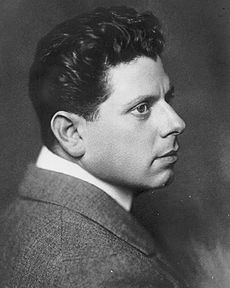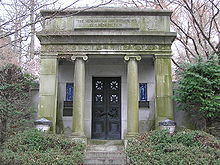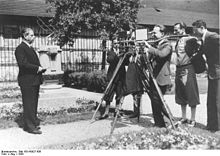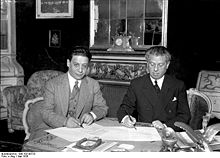- Max Reinhardt
-
This article is about the German theatre director. For the publisher, see Max Reinhardt (publisher).
Max Reinhardt 
Theatre director and actorBorn Maximilian Goldmann
September 9, 1873
Baden bei Wien,
Austria-HungaryDied October 30, 1943 (aged 70)
New York City, NewYork, United StatesResting place Westchester Hills Cemetery Occupation Theatre director, Actor Spouse Helene Thimig Children Gottfried Reinhardt Max Reinhardt (September 9, 1873 – October 30, 1943) was an Austrian (later naturalized American) theater and film director and actor.
Biography
Reinhardt was born Maximilian Goldmann, of Jewish ancestry, in Baden bei Wien, Austria-Hungary. From 1902 until the beginning of Nazi rule in 1933, he worked as a director at various theaters in Berlin. From 1905 to 1930 he managed the Deutsches Theater ("German Theatre") in Berlin and, in addition, the Theater in der Josefstadt in Vienna from 1924 to 1933. By employing powerful staging techniques, and harmonising stage design, language, music and choreography, Reinhardt introduced new dimensions into German theatre.
The Max Reinhardt Seminar in Vienna, which is arguably the most important German-language acting school, was installed implementing his ideas. Siegfried Jacobsen wrote Max Reinhardt in 1910.
In 1920, Reinhardt established the Salzburg Festival with Richard Strauss and Hugo von Hofmannsthal, notably directing an annual production of the morality play Everyman about God sending Death to summon a representative of mankind for judgement.
After the Anschluss of Austria to Nazi-governed Germany in 1938, he emigrated first to England, then to the United States, where he had already successfully directed his own play The Miracle in 1924, and a popular stage version of Shakespeare's A Midsummer Night's Dream in 1927.
Reinhardt followed that success by directing a film version in 1935 using a mostly different cast, that included James Cagney, Mickey Rooney, Joe E. Brown and Olivia de Havilland, amongst others. Mickey Rooney and Ms. de Havilland had also appeared in Reinhardt's 1934 stage production, which was staged at the Hollywood Bowl. The Nazis banned the film because of the Jewish ancestry of both Reinhardt and Felix Mendelssohn, whose music (arranged by Erich Korngold) was used throughout the film.
Reinhardt also opened the Reinhardt School of the Theatre in Hollywood, on Sunset Boulevard. Several notable stars of the day received classical theater training, among them actress Nanette Fabray.
In 1940 he became a naturalized citizen of the United States. At that time, he was married to his second wife, the actress Helene Thimig.
Max Reinhardt and film
Reinhardt was much more interested in film than most of his contemporaries in theater. He made films as a director and from time to time also as a producer. His first staging for the film was Sumurûn (1910). After that, Reinhardt founded his own film company. He was chosen to direct the film adaptation Das Mirakel (1912). Controversies around the staging of Mirakel, which was shown in the Vienna Rotunde in 1912, led to Reinhardt's retreat from the project. The author of the play, Reinhardt's friend and confidant Karl Vollmoeller, won the French director Michel-Antoine Carré to finish the shooting.
Reinhardt made the films Die Insel der Seligen and Eine venezianische Nacht for the German film producer Paul Davidson, in 1913 and 1914. Both films meant a lot of work for Reinhardt's cameraman Karl Freund, as Reinhardt also demanded special shootings like that of a lagoon in the moonlight.
Die Insel der Seligen was praised by the critics above all for Reinhardt's work on the clearness of expression and a vivid play of the features. The film attracted attention through its erotic acting. Its ancient mythical setting included sea gods, nymphs, and fauns, and the actors appeared naked. The part playing in the present fit the strict customs of the time of the late German resp. Austrian monarchy. The actors had to live up to the demands of double roles. Wilhelm Diegelmann and Willy Prager played the bourgeois fathers as well as the sea gods, Ernst Matray a bachelor and a faun, Leopoldine Konstantin the Circe.
Censors demanded the according scenes to be removed, but these demands weren't fulfilled.
The shooting for Eine venezianische Nacht by Karl Gustav Vollmoeller took place in Venice. Maria Carmi played the bride, Alfred Abel the young stranger, and Ernst Matray Anselmus and Pipistrello. The shooting was disturbed by a fanatic who incited the attendant Venetians against the German speaking staff.
In 1935, Reinhardt directed his first film in the US, A Midsummer Night's Dream.
Reinhardt's theater work was strongly inspired by the film. He transferred the stylistic principles of his theater work all too strongly to the film and didn't know to exploit the own means of the film creatively. Therefore, his films weren't great successes.
Reinhardt, different than many other stage directors, encouraged his actors to work for the film.
He founded the drama schools Hochschule für Schauspielkunst „Ernst Busch“ in Berlin and the Max Reinhardt Seminar. Many alumni of these schools made their career in film.
Death
Reinhardt died in New York City in 1943 and is interred at Westchester Hills Cemetery in Hastings-on-Hudson, Westchester County, New York.
His son, Gottfried Reinhardt, was a well-regarded film producer. His grandson (by adoption), Stephen Reinhardt, is a labor lawyer who has served notably on the United States Court of Appeals for the Ninth Circuit since his appointment by Jimmy Carter in 1980.
 The mausoleum of Max Reinhardt in Westchester Hills Cemetery
The mausoleum of Max Reinhardt in Westchester Hills Cemetery
Work on Broadway
- Sumurun (pantomime) (1912) - leader of the Deutsches Theater of Berlin on a New York tour
- The Miracle (1924) - Co-playwright and Director
- A Midsummer Night's Dream (revival) (1927) - Producer
- Jederman (1927) - Co-producer
- Peripherie (1928) - Playwright
- Redemption (revival) (1928) - Director
- The Eternal Road (musical Biblical pageant) (1937) - Director
- The Merchant of Yonkers (1938), Thornton Wilder's play, later rewritten as "The Matchmaker". (This play had nothing to do with "The Merchant of Venice".)
- Sons and Soldiers (1943) - Producer and Director
Films
External links
- Max Reinhardt Archives and Library at Binghamton University, State University of New York
- Max Reinhardt at the Internet Broadway Database
- Max Reinhardt at the Internet Movie Database
- A hard-nosed Utopian By Esther Slevogt at signandsight.com
- Max Reinhardt at Find a Grave
- Michael Frayn's play Afterlife, based on Reinhardt's life: National Theatre, London (2008) [1]
- Literature on Max Reinhardt
See also: Reinhardt (disambiguation) and GoldmannCategories:- 1873 births
- 1943 deaths
- People from Baden bei Wien
- Austrian Jews
- Jewish actors
- Opera directors
- Austrian theatre directors
- American theatre directors
- Austrian emigrants to the United States
- Naturalized citizens of the United States
- American people of Austrian-Jewish descent
- Burials at Westchester Hills Cemetery
- People who emigrated to escape Nazism
Wikimedia Foundation. 2010.


